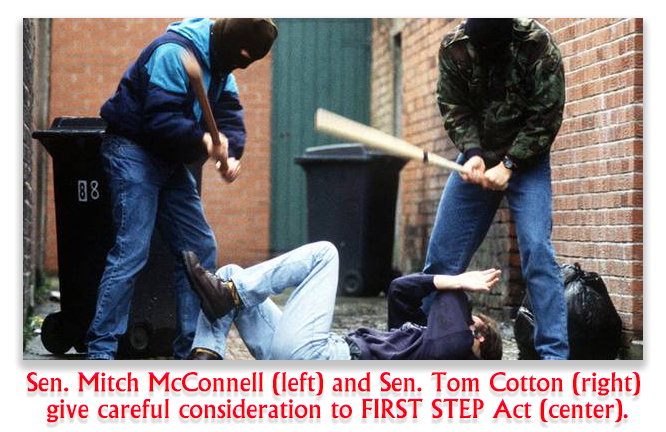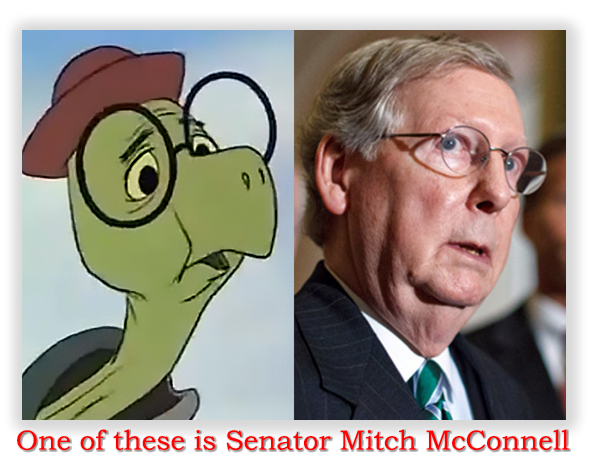We post news and comment on federal criminal justice issues, focused primarily on trial and post-conviction matters, legislative initiatives, and sentencing issues.

MCCONNELL KNEECAPITATES FIRST STEP ACT
 After asking Democrats earlier this week to work more collaboratively with Republicans, Senate Majority Leader Mitch McConnell (R-Kentucky) last Thursday mugged the FIRST STEP Act, Congress’s best remaining chance to accomplish something bipartisan this year. McConnell told President Trump in a private meeting on Thursday that the Senate lacks the floor time to bring the FIRST STEP prison reform measure to a vote this year, regardless of how much support the measure has.
After asking Democrats earlier this week to work more collaboratively with Republicans, Senate Majority Leader Mitch McConnell (R-Kentucky) last Thursday mugged the FIRST STEP Act, Congress’s best remaining chance to accomplish something bipartisan this year. McConnell told President Trump in a private meeting on Thursday that the Senate lacks the floor time to bring the FIRST STEP prison reform measure to a vote this year, regardless of how much support the measure has.
On Wednesday, shortly after Trump announced his support for the modified FIRST STEP Act, amended to add some sentencing reform provisions, McConnell cautioned (without outright spindling the Act), “We don’t have a whole lot of time left, but the first step is to finalize what proponents are actually for. There have been a lot of different versions floating around. And then we’ll whip it and see where the vote count is.”
A day later, McConnell said the measure would not get a vote, because he estimated he would need ten floor days to get FIRST STEP passed. There are only 15 legislative days left in the year, and other legislative priorities – such as passing bills related to government funding and farming – would get priority. The Senate is recesses for the year on December 14th.
McConnell reluctantly promised in September that if FIRST STEP secured the support of at least 60 senators, he would be bring the bill to a vote. Earlier last week, McConnell hedged his bets, saying he would still assess the amount of support for the measure, but he cautioned that he would have to “see how it stacks up against our other priorities going into the end of our session.”
Every Congress is a two-year session that begins in January of an odd-numbered year and ends in December of the next even-numbered year. The last two years has been the 115th Congress, which ends next month. Whenever a session of Congress ends, any bill that has been introduced but not passed dies. This means that if FIRST STEP does not pass the Senate by mid-December, the measure will expire. It will have to start over again in House and Senate committees in January 2019.
As Senate Majority Leader, McConnell controls the Senate floor.
Lawmakers from both parties have been working feverishly to pass the compromise legislation. At the urging of son-in-law and White House advisor Jared Kushner, Trump enthusiastically endorsed FIRST STEP this week, and House Speaker Paul D. Ryan (R-Wisconsin), who controls the House of Representatives, pledged to move it across the finish line in the House “this term.” But McConnell’s refusal to schedule FIRST STEP for floor time all but drives a stake through prison reform’s heart.
If the bill had enough support, McConnell said, he would be willing to bring it up next year after the new Congress is seated. Because the measure would have to go through committees again, and due to the change in control of the House from the Republicans to the Democrats, some argue McConnell’s commitment is half-hearted at best. Supporters of the legislation believe that is being a less-than-neutral arbiter, saying that even if it could be brought to the floor quickly next session, Democrats in the House who favor farther-reaching retroactive sentencing reform could collapse the current compromise.
 McConnell’s slow-motion strangulation of FIRST STEP is not the first-time criminal justice reform has run into the Majority Leader. A similar coalition of legislators and interest groups made a higher-profile and more expansive attempt to pass the Sentencing Reform and Corrections Act of 2015 two years ago, a measure that had Ryan’s support as well as plenty of Senate backing. But McConnell, worried that passing the bill would hurt Republicans at the polls in the 2016 elections, refused to bring that bill to a vote.
McConnell’s slow-motion strangulation of FIRST STEP is not the first-time criminal justice reform has run into the Majority Leader. A similar coalition of legislators and interest groups made a higher-profile and more expansive attempt to pass the Sentencing Reform and Corrections Act of 2015 two years ago, a measure that had Ryan’s support as well as plenty of Senate backing. But McConnell, worried that passing the bill would hurt Republicans at the polls in the 2016 elections, refused to bring that bill to a vote.
Holly Harris, executive director of the nonprofit Justice Action Network said on Saturday that 70 to 80 senators already support the proposal. “Leader McConnell made a promise to us that if he had 60 votes, he would make time to move our bill,” Harris said. “I still believe he will keep that promise, especially now with President Trump’s endorsement.”
Delaying a vote on criminal justice reform would not be in McConnell’s best interest, Harris said. “If there is any sort of political concern,” Harris said. “it should be in not supporting this bill.”
In a statement to the Louisville Courier Journal, Sen. Rand Paul (R-Kentucky) said McConnell is “nothing if not a smart politician” and that he believes McConnell will allow a vote before the end of 2018.
Ohio State University law professor Doug Berman said last Friday in his Sentencing Law and Policy blog, “I am now inclined to fear that no significant form of federal criminal justice reform will be completed as long as Senator McConnell is the Senate’s majority leader.”
New York Times, McConnell Tells Trump a Criminal Justice Bill Is Not Likely This Year (Nov. 16, 2018)
Louisville Courier-Journal, Mitch McConnell tells Trump prison reform vote unlikely (Nov. 17, 2018)
– Thomas L. Root


